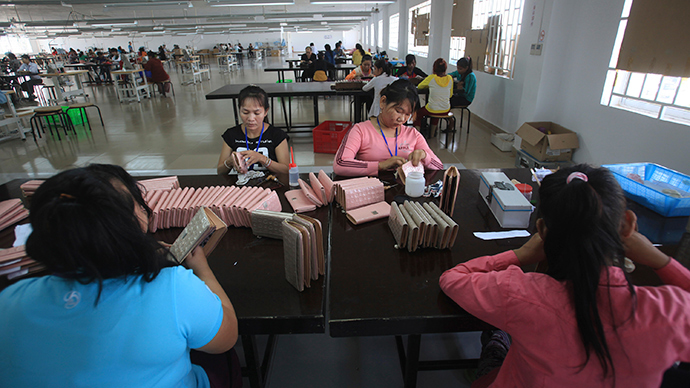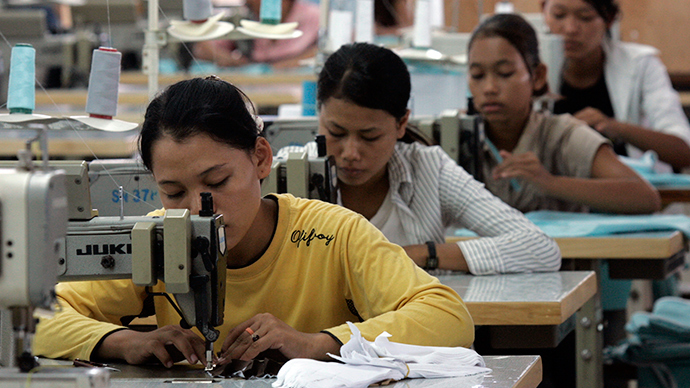‘Exploitation’: Clothing labels accused of Cambodia worker discrimination, child labor

Human Rights Watch has lashed out at European retail giants over "discriminatory labor conditions" in Cambodian factories, most of which exploit young women. HRW claimed in its report that one of the retailers, H&M, uses child labor.
The Human Rights Watch 140-page report is based on interviews with 270 workers from 73 factories, as well as international apparel brand representatives. Of some 200 apparel brands that source from Cambodia, Human Rights Watch said it was in contact with Adidas, Armani, Gap, H&M, Joe Fresh, and Marks and Spencer.
In one of the factories, which produces clothes for H&M,
workers owned up they had been made to work on their days off
"to help meet production targets." They worked on
H&M garments without overtime pay, however.
They also told Human Rights Watch that the factory employed some
children below the legally-permissible age of 15, and that those
kids were made to work as hard as the adults.
“Some of the worst employment-related crimes happen at the
larger factories' smaller suppliers. The reason is that nobody
really investigates them,” senior women’s rights researcher
at Human Rights Watch, Aruna Kashyap, told Swedish broadcaster SVT.
HRW says workers in Cambodia’s garment factories, producing
name-brand clothing sold in the US, Canada and Europe, often come
to grips with "discriminatory and exploitative labor
conditions."
According to HRW, the combination of short-term contracts which
make it easier to get rid of workers at any moment, poor
government labor inspection and enforcement, as well as
aggressive tactics against independent unions make it extremely
difficult for workers to assert their rights.
Meanwhile, according to the Cambodian Ministry of Industry and
Handicraft, women make up 90 percent of the country’s more than
700,000 garment workers in 1,200 garment businesses.
Pregnancy-related discrimination and sexual harassment at the
workplace are the two key concerns for women employees, according
to HRW. Cambodia’s Labor Law prohibits sexual harassment, but
doesn't even bother to define it.

Human Rights Watch spoke to workers at a factory which produced
for Gap. The factory allegedly discriminated against pregnant
workers in hiring. Workers reported that women who gave birth did
not receive maternity pay even when they had worked at the
factory for over a year. The workers described seeing a fellow
worker dismissed for refusing overtime work. Even though the
factory employed more than 300 workers, there was no infirmary or
nurse in the factory. They also said the managers of the factory
had taken a "hostile approach to unions,” so workers
were scared of even forming a union or openly organizing within
factory premises.
The report said many international clothing brands had failed to
promote workers' rights because of poor supply chain
transparency, the absence of protection for whistleblowers and a
failure to help factories correct problems.
READ MORE: Cambodian protesters killed as police crack down on garment workers' rally (PHOTOS)
"These global apparel brands are household names," Kashyap
said. "They have a lot of leverage, and can and should do
more to ensure their contracts with garment factories are not
contributing to labor rights abuses."
Workers from the factory producing for Marks and Spencer told HRW
that factory managers allegedly fired those who raised concerns
about working conditions. Issues raised by workers interviewed by
the group included discrimination against pregnant workers, lack
of sick leave, forced overtime and threats against unionizing.
Although under international law the Cambodian government has
obligations to ensure that the rights of workers are respected,
local labor inspectorate has been "wholly ineffectual and the
subject of numerous corruption allegations," HRW says.
Garment and textile exports are quintessential for the Cambodian
economy. In 2013, Cambodian global exports amounted to $6.48
billion, of which garment and textile exports accounted for $4.96
billion.












